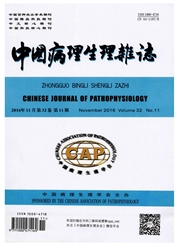

 中文摘要:
中文摘要:
目的:探讨宫内感染致仔鼠脑损伤后对认知发育和海马神经发生的影响。方法:15只SpragueDawley孕鼠(孕15 d)按随机数字表法分为造模组(8只)和对照组(7只)。繁殖后的2组雄性仔鼠按随机数字表法分为宫内感染组(35只)和对照组(35只),进行大脑解剖学观察、神经细胞凋亡检测、Morris水迷宫实验、神经细胞增殖及存活分析。结果:(1)宫内感染组仔鼠大脑较对照组萎缩,TUNEL阳性细胞数和caspase-3阳性细胞数均较对照组显著增加(P〈0.05)。(2)宫内感染组仔鼠近期记忆及远期记忆保持能力均较对照组降低,潜伏期显著延长(P〈0.05)。(3)细胞增殖分析显示宫内感染组3、7和14日龄仔鼠Brd U阳性细胞数较对照组显著增加(P〈0.05);细胞存活分析显示,28日龄的2组仔鼠Brd U阳性细胞数无显著差异(P〉0.05)。结论:宫内感染可致仔鼠脑损伤,海马神经细胞凋亡可能与认知发育障碍密切相关。宫内感染诱导的神经发生可能与脑损伤后神经自身修复有关。
 英文摘要:
英文摘要:
AIM: To explore the effect of brain injury induced by intrauterine infection on offspring's cognitive development and hippocampal neurogenesis. METHODS: Sprague-Dawley pregnant rats( n = 15) were randomly divided into model group( n = 8) and control group( n = 7). After delivery,the male pups were randomly divided into E. coli group( n = 35) and control group( n = 35). Total 20 male pups at postnatal day 28( P28) were randomly divided into 2groups for Morris water maze test. Hippocampi of the 2 groups were used for cell apoptosis,neuronal proliferation and survival analysis. RESULTS:( 1) The brain tissue was slightly atrophied in E. coli group. The numbers of TUNEL and caspase-3 positive cells were significantly increased in E. coli group( P〈0. 05).( 2) In the navigation and memory task,the rats in E. coli group had longer escape latency than that in control group( P〈0. 05).( 3) There was a significant increase in the Brd U-labeled cells at P3,P7 and P14 in E. coli group than that in control group( P〈0. 05). When the cells got mature,no significant difference of Brd U-labeled cells at P28 between the 2 groups was observed( P〉0. 05). CONCLUSION: Intrauterine infection increases hippocampal neuronal apoptosis,which may be regarded as an etiological factor in the cognitive development impairment. Inflammation-induced neurogenesis may play an important role in neuronal protection and repair in immature brain after intrauterine infection.
 同期刊论文项目
同期刊论文项目
 同项目期刊论文
同项目期刊论文
 期刊信息
期刊信息
